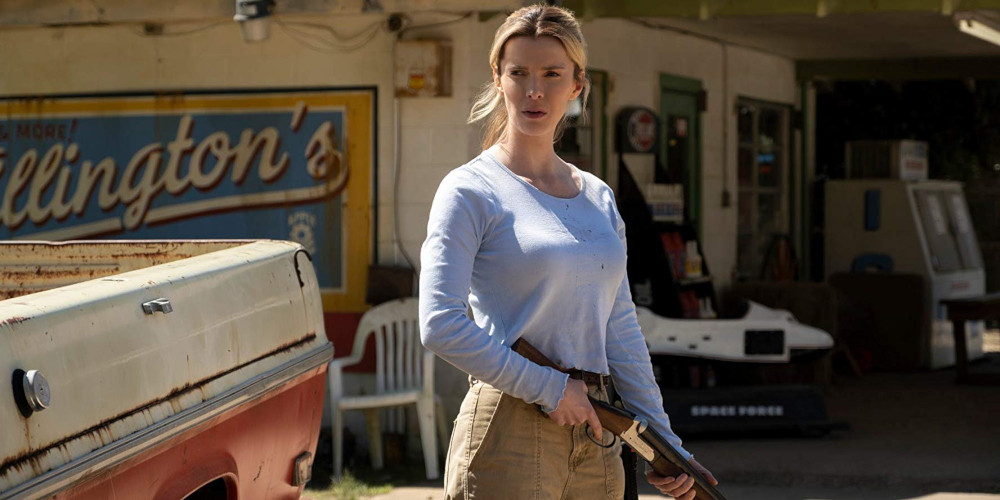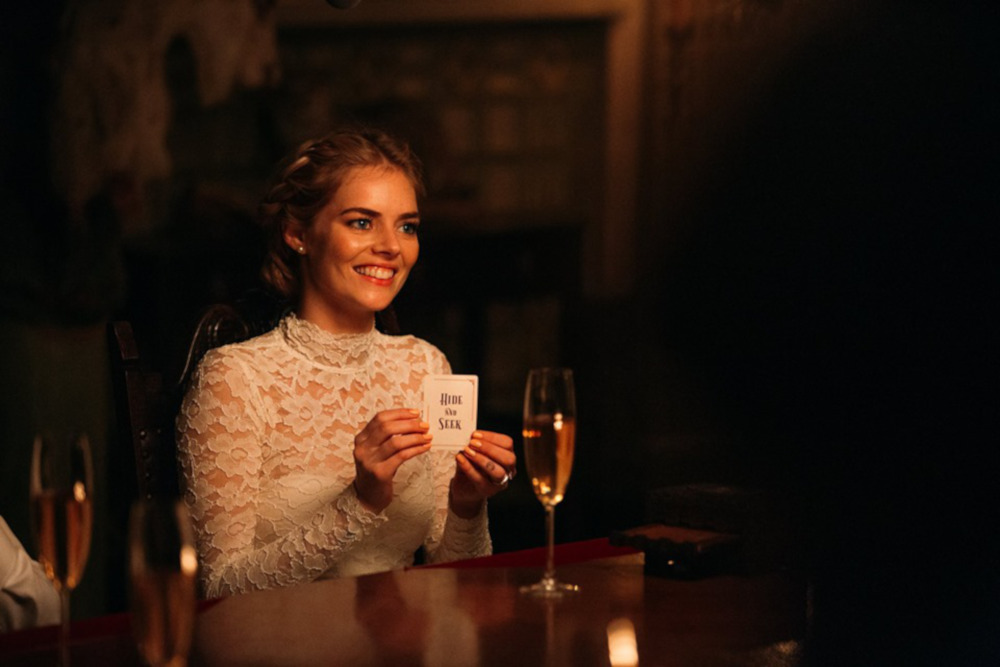“Fucking rich people!”
This line, uttered as a would-be good Samaritan drives away in a luxury car instead of pausing to prevent bloody murder, pretty much sums up Ready or Not, a darkly hilarious new entry in the ever-expanding cinema of discontent inspired by the one percenters and Donald Trump.
Before newlyweds Grace and Alex can begin their new life together, they have to partake of an old family tradition. Alex is heir to the vast Le Domas family fortune made in the board game business generations ago. Grace, an orphan, is all too happy to find a sense of belonging for the first time in her life.
The Le Domases have a ritual with any new person seeking to join the family. On the stroke of midnight, a game is chosen at random and must be played to completion by dawn. It could be backgammon, Old Maid or any number of familiar games, but Grace happens to draw hide-and-seek, the one game that just might kill her.
As members of the Le Domas family hunt Grace through their palatial mansion with the intent of sacrificing her in a satanic ritual, it becomes evident that the family fortune wasn’t achieved through honest work. It required a little mystical help, ultimately coming at a steep cost. We’re never told how many people have paid the ultimate price to appease the family’s mysterious benefactor, but indications are that one new member of Le Domas clan is killed every generation, ensuring the others a free pass, along with a harmless bout of snakes and ladders.
Here, class war becomes a literal bloody fight to the death. Unarmed and outnumbered, Grace does have one advantage: she’s up against a group of people who’ve spent their lives failing upwards and assuming they were the best without ever having to prove it.
Directors Matt Bettinelli-Olpin and Tyler Gillett and producer Chad Villella (the horror collective known as Radio Silence) don’t mince words when it comes to the film’s allusions or the Le Domas family’s role as a symbol of wealthy, cruel, mediocre people born into a violent legacy that they gleefully participate in.
“Have you been paying attention to what’s going on in the States right now? We are currently living through the dumbest human being ever running our country, so it seemed like the timing is right,” Bettinelli-Olpin told The Tyee.
“Why would he be capable of doing anything well?” adds Gillett. “When you’re given everything, and you’re not forced to learn to do anything with any competence, that is the heart of entitlement.”
Horror has always responded to its sociopolitical context in some way or another. There is no Dracula without fears of the Eastern European Other. There is no Night of the Living Dead without the Civil Rights movement or the horrors of the Vietnam War. There is no Rosemary’s Baby without the rise of second-wave feminism and the fight for reproductive rights.
Following the Columbine high school shooting and 9-11 terror attacks, the 2000s saw a slew of nihilistic horror films focused on random violence and suffering, best exemplified in the Saw, Hostel and Final Destination franchises.
But recent horror films have leaned into more specific reference points. Last year’s Monster Party featured a Serial Killers Anonymous group giving into their basest urges. The film offered a direct nod to Trump and his “Make America Great Again” base. The killers’ relapse is a return to the seething racism and violence that festered in plain sight under the first Black president in U.S. history.
Jordan Peele’s Oscar-winning Get Out tackled contemporary or “benevolent” bigotry, while the pre-Trump/post-financial crisis You’re Next featured a dysfunctional, wealthy American family, rotting from within, as a symbol of excess. The Purge franchise has become more overtly political with every subsequent edition, offering a biting critique of the growing gap between the haves and have-nots.
Most recently, Universal Pictures cancelled (or more likely postponed) the release of The Hunt, out of respect for the victims of the El Paso and Dayton shootings, but possibly also in response to comments made by Donald Trump about the film’s anti-Republican themes. According to the Hollywood Reporter, the film sees working class Americans hunted for sport The Most Dangerous Game-style by wealthy “Liberal elites.”
The conservative backlash to The Hunt — which virtually no one has actually seen yet — centred on the notion that the film glorifies the subjugation of Trump voters. Yet the film’s trailers, now quietly removed from YouTube, clearly align audiences with the poor folk fighting for their lives.
Then again, considering the left-leaning talent in front of and behind the camera, one can almost guarantee some kind of bait-and-switch that calls into question who wields power in America. The Hunt clearly has the 2019 political landscape written all over it, and as David Sims suggests in The Atlantic, it functions as a Rorschach test for the politics of the beholder.

There’s no attempt to question who holds the power in Ready or Not. The rich rule with a profoundly clumsy iron fist. It’s big, heavy and savage enough to get the job done most of the time.
As Grace, the intended sacrifice, Australian actress Samara Weaving carries a lot of the film’s emotional weight. Mixing charm and charisma with a sharp edge, Weaving is joined by a terrific supporting cast, including Andie MacDowell and Adam Brody, who play beautifully against type as members of the monstrous Le Domas clan.
But most important, Grace is not like her new family. She has faced the kinds of struggles only a lack of wealth and privilege can throw at you. It’s significant that the other people who have married into the family — and who now join in the hunt — herald from the same privileged upper class.
None of them appear to have “married up,” leaving one with the impression that the game of chance (or fate) that put Grace in the crosshairs may not be so random after all. Mixed marriages don’t work in the world of the Le Domas family. You are either part of the elite, or you are dead.
The logic of class division, soaked into the film’s bloody narrative arc, is critical. If anyone can marry into wealth and power, the illusion of some objectively defensible stratification system is shattered. Grace was born with nothing, and ergo she must die with nothing.
Grace is an outsider who, by her very existence, threatens the us-and-them dynamic the Le Domas family relies on. And even worse, she might actually beat them at their own game. But what’s maybe most radical about Grace’s character is that she is just an ordinary person. She’s no Wonder Woman; she is just a bright young woman willing to put in the work.
Grace stands as a challenge to the greed and entitlement of her new in-laws by being what they never imagined: someone who is inherently more capable and competent than them. They’ve spent their lives surrounding themselves with yes-men and employees who do the heavy lifting they can take credit for later, and they’ve actually convinced themselves they’re superior.
As the film’s co-director Bettinelli-Olpin says, “In another version of this movie, it would be non-stop hunt, hunt, hunt, kill, hunt. They have these scenes where they’re all just sitting around.”
“While the help is doing the killing,” the film’s other co-director Gillett chimes in.
And the hired help really does have to step in, sometimes putting their own necks on the line for their employers. That staff are made complicit in the hunt is just one more indignity foisted upon poor folk, even as they remain entirely disposable.
Horror has a way of lying bare what works and what doesn’t in society with acidic focus. Films like Ready or Not offer some much-needed clarity at a time when monsters hide not in the shadows, but under the bright lights in ill-fitting suits and terrible red hats.
Ready or Not premiered at Fantasia Festival in Montreal last month. It will hit theatres across Canada and the U.S. on Aug. 21. ![]()
















Tyee Commenting Guidelines
Comments that violate guidelines risk being deleted, and violations may result in a temporary or permanent user ban. Maintain the spirit of good conversation to stay in the discussion.
*Please note The Tyee is not a forum for spreading misinformation about COVID-19, denying its existence or minimizing its risk to public health.
Do:
Do not: